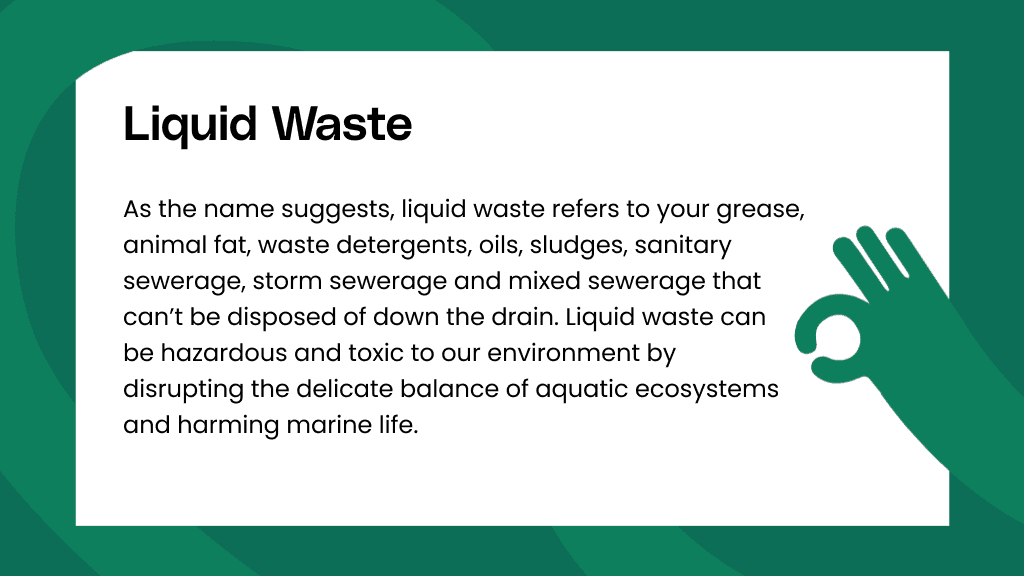How Reclaim Waste can Save You Time, Stress, and Money.
Wiki Article
What Does Reclaim Waste Do?
Table of ContentsUnknown Facts About Reclaim WasteThe Only Guide to Reclaim WasteThe Main Principles Of Reclaim Waste The Facts About Reclaim Waste UncoveredThe smart Trick of Reclaim Waste That Nobody is Discussing
Explore the kinds, occurrences, and forms of liquid waste. Domestic sewer waste describes the waste and products from a residential septic system. This kind of waste is developed by humans in homes, institutions, and various other buildings. This only consists of septic tanks that have a drainpipe field. The correct administration and disposal of residential sewage waste call for liquid waste to be moved to a sewage treatment plant where the correct techniques and equipment are related to cleanse and take care of waste.
Business waste commonly consists of prospective threats, such as combustible materials or a blend of liquid and solid waste items, and requires an extra advanced and thorough disposal procedure. The disposal of commercial waste usually entails the filtration of waste before transportation to make sure risk-free and correct disposal. Industrial waste is produced from by-products and drainage of commercial processes and manufacturing.
This kind of waste can not use the exact same sewer management transport or processes as septic or industrial liquids. The hazardous waste administration procedure needs the inspection and testing of liquid waste prior to it undergoes the disposal process (industrial wastewater treatment). Overflow waste is the liquid waste that originates from overflow and excess stormwater in very booming locations or cities
Drainage waste can trigger contamination and flooding otherwise dealt with correctly. Find out more regarding sewage system cleansing and waste monitoring. Making certain proper waste management can avoid disasters and minimize environmental harm. Both individuals in residential setups and experts in industrial or production sectors can profit from comprehending the processes and guidelines of fluid waste administration.
Not known Facts About Reclaim Waste
Get in touch with PROS Providers today to learn more about our waste monitoring and disposal solutions and the appropriate ways to take care of the fluid waste you produce.(https://trello.com/w/reclaimwaste1/)Do you understand what occurs to your water when you draw the plug, purge the toilet or drain the cleaning maker? No? Well, it deserves understanding. This so-called 'wastewater' is not only an important source however, after therapy, will certainly be launched to our land, waterways or the ocean. Made use of water from commodes, showers, bathrooms, kitchen sinks, washings and commercial procedures is recognized as wastewater.

water made use of to cool equipment or tidy plant and equipment). Stormwater, a kind of wastewater, is overflow that moves from agricultural and metropolitan locations such as roofings, parks, gardens, roads, courses and seamless gutters right into stormwater drains, after rainfall. Stormwater streams without treatment directly to neighborhood creeks or rivers, ultimately getting to the ocean.
Reclaim Waste for Beginners
In Queensland, a lot of wastewater is treated at sewage treatment plants. Wastewater is carried from domestic or industrial websites via a system of sewage systems and pump terminals, recognized as sewage reticulation, to a sewer treatment plant.The Division of Natural Resources suggests local federal governments regarding handling, operating and preserving sewerage systems and therapy plants. In unsewered areas, city governments may require owners to set up private or household sewer treatment systems to treat residential wastewater from bathrooms, kitchen areas, washrooms and washings. The Department of Natural Resources authorises using websites home systems when they are verified to be reliable.
The majority of stormwater receives no therapy. In some new neighborhoods, therapy of some stormwater to remove clutter, sand and crushed rock has begun making use of gross pollutant traps. Wastewater treatment happens in 4 phases: Eliminates strong matter. Bigger solids, such as plastics and other objects wrongly discharged to sewage systems, are eliminated when wastewater is gone through displays.
Makes use of small living microorganisms knows as micro-organisms to damage down and get rid of staying liquified wastes and great fragments. Micro-organisms and wastes are incorporated in the sludge.
An Unbiased View of Reclaim Waste
Nutrient removal is not offered at all sewage therapy plants due to the fact that it needs costly specialised equipment. Clear fluid effluent created after treatment might still have disease-causing micro-organisms - liquid waste disposal melbourne.
Many wastewater moves into the sewage system. Under the Act, regional federal governments provide authorizations and licences for eco appropriate tasks (ERAs) entailing wastewater releases that may have a local influence.
The 5-Minute Rule for Reclaim Waste
Monitoring provides factual information about water quality and can confirm that licence problems are being fulfilled. The details gotten through monitoring offers the basis for making water top quality decisions.Report this wiki page